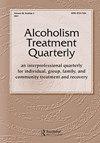Alcohol and Substance Use Initiation, Escalation and Recovery
IF 0.9
Q4 SUBSTANCE ABUSE
引用次数: 0
Abstract
Welcome to the first issue of the 41st volume of the Alcoholism Treatment Quarterly (ATQ). Of particular note is that this volume and issue mark the ATQ’s 13th year of publication with Taylor & Francis. Over the years, we have found our partnership with the publishing house to be effective and helpful in presenting high quality research related to alcohol use disorders (AUD) and other substances use disorders (SUD). Our thanks are extended to all involved. In the next section, we provide a brief overview of the articles included in this issue. Each article contains thoughtful and beneficial information across alcohol and substance use disorder science within several themes. This issue includes several articles with insights about perceptions and decision-making as they relate to alcohol and substance use initiation, escalation and/or recovery. Each work has something for relevant for healthcare professionals, educators and researchers. In the first section of this issue, a study regarding the internalized stigma and self-esteem within individuals with alcohol and risky substance use disorder is presented. Akhan and Gezgin Yazici present research from a study with 233 participants undergoing treatment for AUD or SUD at a training hospital. They sought to determine the internalized stigma and self-esteem levels of patients and identify related influential factors, and then explored correlations alcohol and substance use disorder progression. The results indicate that selfesteem and internalized stigma can be important concepts to explore in clinical settings as both may be related to progression. Nichols and colleagues explored the association between problem drinking, depressive symptoms and suicidal ideation. Their goal was to expound on the literature and provide more precision for examining links between AUD, major depression, and suicidal ideation. These authors drew from the Interpersonal Theory of Suicide (ITOS) and utilized structural equation modeling to explore a complex phenomenon. The next articles present relevant and useful information specific to women and recovery. First, Nowakowski-Sims and Ferrante present their findings from a qualitative study centered around Integrative Body-Mind-Spirit (IBMS) practice among women in a residential recovery program. In this research article the authors detail the need for a gender-responsive approaches to the treatment process. The authors reported that IBMS may be useful as an alternative coping mechanism to alcohol and substance use. Next, Antunes de Campos and colleagues share ethnographic research detailing how women in Brazil conceive and experience their recovery from AUD. This article presents information that contributes to the understanding of gender inequalities in peer self-help group settings. Owens, Banta-Green and Newman provide a thought-provoking piece on a recovery community center model. The authors utilized a grounded theory qualitative approach to explore the perceptions of staff and member facilitators regarding their ideas about which components of the center model were helpful. Among the several themes that emerged from the research, the authors highlighted concepts, such as recovery capital and mechanisms of recovery, that merit further research. ALCOHOLISM TREATMENT QUARTERLY 2023, VOL. 41, NO. 1, 1–2 https://doi.org/10.1080/07347324.2022.2149916酒精和物质使用的开始、升级和恢复
欢迎来到酗酒治疗季刊(ATQ)第41卷的第一期。特别值得注意的是,这一卷和发行标志着ATQ与泰勒和弗朗西斯出版的第13年。多年来,我们发现我们与出版社的伙伴关系在介绍与酒精使用障碍(AUD)和其他物质使用障碍(SUD)有关的高质量研究方面是有效和有益的。我们向所有相关人员表示感谢。在下一节中,我们将简要概述本期中包含的文章。每篇文章都包含了几个主题中关于酒精和物质使用障碍科学的深思熟虑和有益的信息。本期包括几篇文章,对与酒精和物质使用的开始、升级和/或恢复有关的观念和决策有深刻见解。每一项工作都与医疗保健专业人员、教育工作者和研究人员有关。在这一期的第一部分,一项关于酒精和危险物质使用障碍个体的内化耻辱和自尊的研究被提出。Akhan和Gezgin Yazici介绍了一项对233名在培训医院接受AUD或SUD治疗的参与者的研究。他们试图确定患者的内化耻辱和自尊水平,并确定相关的影响因素,然后探索酒精和物质使用障碍进展的相关性。结果表明,自尊和内化耻辱感可能是临床环境中探索的重要概念,因为两者都可能与进展有关。尼科尔斯和他的同事研究了酗酒问题、抑郁症状和自杀意念之间的关系。他们的目标是详细阐述文献,并为检查AUD、重度抑郁症和自杀意念之间的联系提供更精确的信息。作者从人际自杀理论(ITOS)出发,运用结构方程模型来探讨这一复杂现象。接下来的文章将提供有关妇女和康复的有用信息。首先,Nowakowski-Sims和Ferrante从一项定性研究中提出了他们的发现,该研究以住院康复项目中女性的综合身心精神(IBMS)实践为中心。在这篇研究文章中,作者详细说明了对治疗过程采取性别敏感方法的必要性。作者报告说,IBMS可能是一种有效的替代酒精和物质使用的应对机制。接下来,Antunes de Campos和他的同事分享了一项人种学研究,详细介绍了巴西女性是如何怀孕的,以及她们如何从AUD中恢复过来的。本文提供的信息有助于理解同伴自助小组设置中的性别不平等。欧文斯、班塔-格林和纽曼提供了一篇发人深省的关于康复社区中心模式的文章。作者利用扎根理论定性的方法来探讨工作人员和成员引导者关于他们关于中心模型的哪些组成部分是有帮助的想法的看法。在研究中出现的几个主题中,作者强调了值得进一步研究的概念,如恢复资本和恢复机制。酒精中毒治疗季刊,2023年,第41卷,no . 4。1,1 - 2 https://doi.org/10.1080/07347324.2022.2149916
本文章由计算机程序翻译,如有差异,请以英文原文为准。
求助全文
约1分钟内获得全文
求助全文
来源期刊

Alcoholism Treatment Quarterly
SUBSTANCE ABUSE-
CiteScore
1.60
自引率
11.10%
发文量
31
期刊介绍:
Alcoholism Treatment Quarterly is an exciting professional journal for clinicians working with persons who are alcoholic and their families. Designed to bridge the gap between research journals and information for the general public, it addresses the specific concerns of professional alcoholism counselors, social workers, psychologists, physicians, clergy, nurses, employee assistance professionals, and others who provide direct services to persons who are alcoholic. The journal features articles specifically related to the treatment of alcoholism, highlighting new and innovative approaches to care, describing clinical problems and solutions, and detailing practical, unique approaches to intervention and therapy.
 求助内容:
求助内容: 应助结果提醒方式:
应助结果提醒方式:


